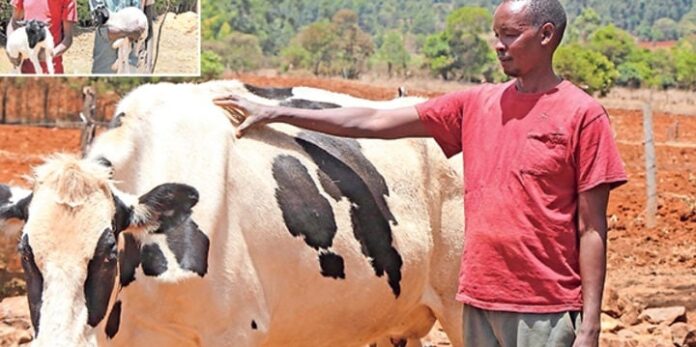After quitting employment in 2006, Erick Kiprotich embarked on a farming project, a decision that he doesn’t regret to date.
His two-acre farm in Nandi County hosts dairy cows and Dorper sheep, as well as a variety of crops, including maize, sukuma wiki, and nappier grass.
Kiprotich started small with Sh10,000, which he used to purchase a calf from a livestock market in the region. A year later, he bought two Friesian cows from a neighbor, which have since multiplied to 13 cows.
“The animal helped me learn the ropes of cow management, which gave me the impetus to go big. I invested about Sh. 200,000 to start the dairy enterprise and adopted zero grazing,’’ he said.
The animals are hosted in a well-structured shed made of concrete floor to prevent accidents like sliding. The floor is cleaned daily and disinfected to prevent foot rot diseases.
Muiru: Farmer who started as a milkman flaunts his multimillion dairy farm and a coffee plantation
Kiprotich feeds his animals with a variety of fodder, including nappier grass, desmodium, sweet potatoes, and hay mixed with molasses. To boost their calcium and magnesium intake, he feeds them silage made from maize and mineral salt.
Dairy cows need calcium for optimum milk production and growth rate, while magnesium supports the animal’s health and prevents deficient conditions.
According to experts, the amount of milk dairy cows produce is determined by the quality of the feed. The cow needs a balanced diet that includes starch, protein, fibre, minerals, water, and protein in sufficient amounts
Kiprotich’s cows produce an average of 200 liters of milk per day which he sells at Sh. 50 per liter. Part of the milk is used to make Mursik, a local delicacy popular with the Kalenjin community, which he sells at Sh. 60 per liter.
The cows are dewormed every three months, and calves every month to boost growth. Kiprotich doubles up as a Dorper sheep farmer. He sells each sheep at between Sh. 10,000 and Sh. 15,000. In a year, he sells up to 12 sheep.









